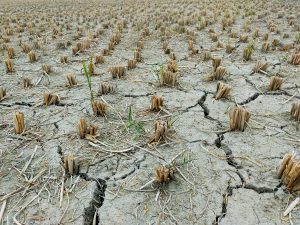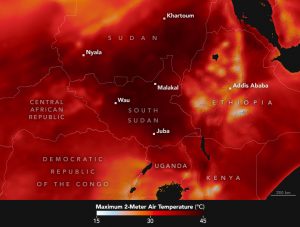Heatwaves and Climate Disruption in Africa and Beyond
May 4th, 2024 | By admin | Category: Climate ChangeBy Joshua Mirondo, Transition Earth.
April marked the 11th consecutive month of record global heat, and countries around the world are breaking heat records. The unprecedented temperatures are taking a toll on people (and nature), making daily life a challenge for many.
This is especially true in Sub-Saharan Africa.
Since the start of 2024, there has been a tremendous increase in temperatures in this region. Let’s take a closer look at impacts in Uganda and South Sudan.
Uganda’s climate is generally tropical, which is warm and sunny all year round with temperatures ranging from 21-25°C (70-77°F). However, between January and March, it shot up to 30°C and above 40°C in South Sudan. Ugandans took the internet by storm and complained about the situation. However, climate experts urged citizens to take precautions to stay safe during this period. Some of the precautions included staying hydrated, seeking shade, and avoiding prolonged exposure to the sun. Uganda has been experiencing two rainy seasons and two dry seasons throughout the year, but it varies across different regions of the country.
Heatwaves and extreme heat scenarios have major implications for students who attend classes in buildings that lack proper ventilation and air conditioning. In South Sudan, both the health and education ministries issued advisories to parents to keep all children indoors as temperatures were expected to soar to 45°C. They warned that any school found open during that time would have its registration withdrawn, but didn’t specify how long the schools would remain shuttered. After two weeks of closure, the schools were then reopened.
Reports also came from Nairobi, Kenya, where temperatures hit about 24 degrees celsius, and other areas of the country recorded even higher temperatures of 27°C and above. Currently, Kenya is facing heavy rains that have caused severe flooding and landslides across the nation (and Tanzania as well).
The heat wave spread to other areas of sub-Saharan Africa and other parts of the world, with South and Southeast Asia being hit particularly hard.
Effects of a heatwave
The United Nations indicates that if precautions are not taken, intense heat waves can lead to an increased risk of chronic respiratory and heart conditions, organ dysfunction like kidney failure, and chronic issues due to congenital defects. In Bamako, Mali, the Gabriel-Toure Hospital reported a surge in excess deaths, with 102 deaths over the first four days of April. Most of the people who died were above 60 and the hospital said that heat likely played a role in many of the deaths. Ice has become a prized – and expensive – commodity.
In 2015, the World Health Organization reported 1,660,000 deaths due to extreme temperatures. It also indicated that 175 million people were exposed to heat waves compared to average years, implying it is something that shouldn’t be ignored because of its adverse effects.
What should be done?
Recent events like flooding and abnormally high temperatures in many parts of the globe have shown the vast challenges that are associated with climate change. The need for sustainability projects, for instance the planting of trees and awareness campaigns, cannot be overstated in this epoch, according to Charles Gavamukulya, a Ugandan engineer.
The World Health Organization recommends staying hydrated, avoiding strenuous activities during peak heat, seeking shade or air conditioning, wearing lightweight and light-colored clothing, and checking on vulnerable individuals like the elderly and infants during extreme temperatures. Governments all over Africa have also been encouraging people to be cautious and avoid exposing their bodies to heat because of its severe effects.
This is likely the new normal throughout much of the world, and people will need to heed the warnings and adapt, to protect human health.
Joshua Mirondo is a program associate with Transition Earth, based in Uganda.



![[Photo: mrjn Photography , Unsplash]](http://populationgrowth.org/wp-content/uploads/2024/05/Unsplash-mrjn-photography-YpZ2cj4s0oo-unsplash-200x300.jpg)